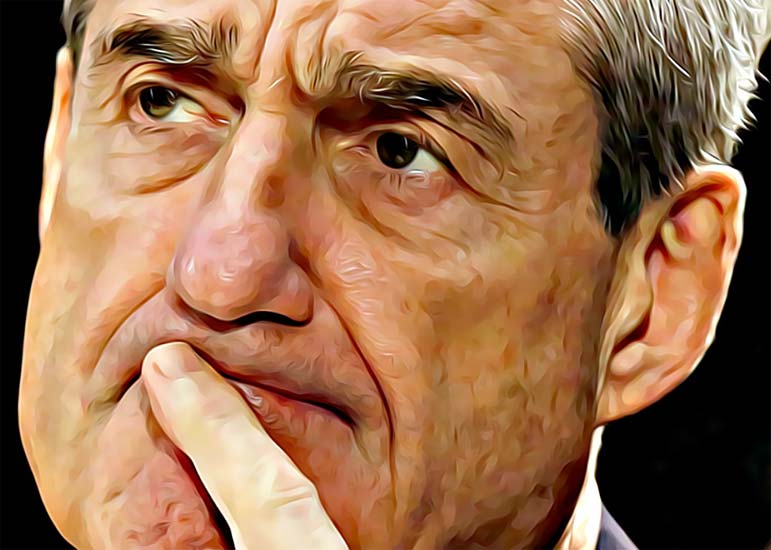
That this is a fair question to ask is itself troubling. Our justice system strives to avoid the appearance of impropriety. Sure, we pounce when we detect actual corruption. But the rule of law requires that the public integrity of law enforcement be safeguarded. It is not enough to be fair. Things must appear fair - even more so when a special counsel, appointed precisely to avoid the appearance of bias, is concerned.
In Mueller's case, there are various grounds for worry. Mueller's investigation was triggered when former FBI director James Comey, no fan of the president who dismissed him, leaked a memo of a meeting with President Donald Trump. Comey admitted hoping this revelation would lead to appointment of a special counsel.
Furthermore, the investigative team Mueller has assembled includes Democratic donors and supporters, including one lawyer who represented the Clinton Foundation and one who represented a subject in the Hillary Clinton email investigation. This month, moreover, it came to light that two members of the team, who had also worked on the Clinton email investigation, were having an extramarital affair and exchanged text messages expressing partisan political views - favoring Clinton and depicting Trump as "loathsome."
Worse, in one August 2016 text, one of them, FBI agent Peter Strzok, asserted that the FBI "can't take that risk" that Trump could be elected, equating some unspecified action against this seemingly unlikely possibility to "an insurance policy in the unlikely event you die before you're 40." Dismayingly, this text, which crosses the line between political banter and tainted law enforcement, refers to a meeting in the office of FBI Deputy Director Andrew McCabe, then (and now) the bureau's No. 2 official. While not as weighty, legitimate questions have been raised about McCabe's own objectivity, his wife's state Senate campaign having been lavishly funded by groups tied to Virginia Gov. Terry McAuliffe, D, a Clinton insider.
On the positive side, Mueller immediately removed Strzok from the case after the texts came to light. (The other texter, FBI lawyer Lisa Page, had already left the team.) Further, a critical metric of Mueller's tenure is how he has performed. To date, he has brought three sets of charges: an indictment against former Trump campaign chairman Paul Manafort and his associate Rick Gates and two false-statements cases, against Michael Flynn (fleetingly Trump's national security adviser) and George Papadopoulos (a minor Trump campaign adviser). None of these cases bears on the 2016 election or suggests any wrongdoing on Trump's part.
Thus, while there is cause for concern, the results Mueller has produced so far appear free of political taint. And at least in the matter of Strzok, Mueller was scrupulous about removing what was, at the least, the appearance of impropriety.
That appearance is not established by mere expression of political opinion or activism. I was a federal prosecutor in New York for many years, and I was not shy about sharing my conservative political views. Nor were my colleagues - my best friends in the office were liberal Democrats. But it was understood that our politics were checked at the door.
It is required, though, that they remain ever-mindful that the appearance of fairness is as important as the reality. That doesn't mean opinionated investigators must bow out of politically fraught cases. But they should grasp what makes a case so fraught and remove themselves if particular views they hold could undermine an investigation.
Personally, I am not much alarmed that several of Mueller's staffers have anti-Trump political views. But as more evidence emerges, I have become increasingly disturbed about whether those views will taint perception of the Mueller investigation, particularly in the case of Andrew Weissmann, a key Mueller deputy. A gifted career Justice Department lawyer, Weissmann sent former acting attorney general Sally Yates an effusive email shortly after Yates was fired for insubordinately defying Trump on enforcement of the so-called travel ban. The obstruction aspect of Mueller's investigation calls for an objective evaluation of how much independence law-enforcement officials have from the chief executive. Weissmann's lauding of Yates suggests he is not objective on this point.
For Trump, the best outcome is that he leaves Mueller in place and is exonerated. For Mueller, the best outcome is that the public accepts the integrity of whatever decisions he makes. In that regard, I began with the belief that Mueller was a superb choice whose well-earned reputation for personal integrity would be critical. I still think so, but I've been shaken by his puzzling insensitivity to the imperative that his staff be, and be seen as, driven by evidence, not anti-Trump bias.
Just as Mueller would not have recruited Strzok had he known of the texts, one imagines he would have passed on Weissmann had he known of his email paean to Yates. Removing Weissmann, just as Mueller removed Strzok, would be a reassuring course correction.
McCarthy is a former federal prosecutor and a contributing editor at National Review.
Previously:
• 07/17/17: The Donald Trump Jr. emails definitely show collusion. But collusion in what?
• 06/12/17: What Comey described wasn't obstruction of justice. Here's why


 Contact The Editor
Contact The Editor
 Articles By This Author
Articles By This Author